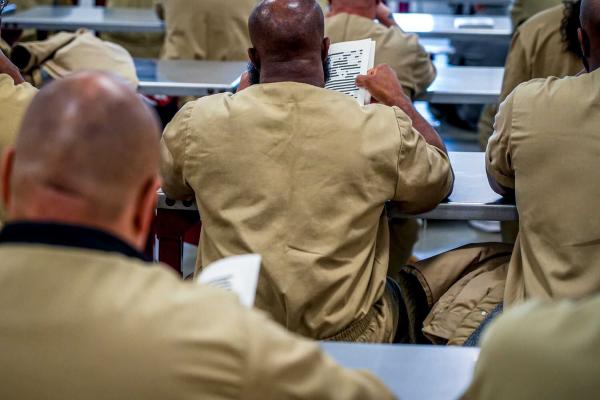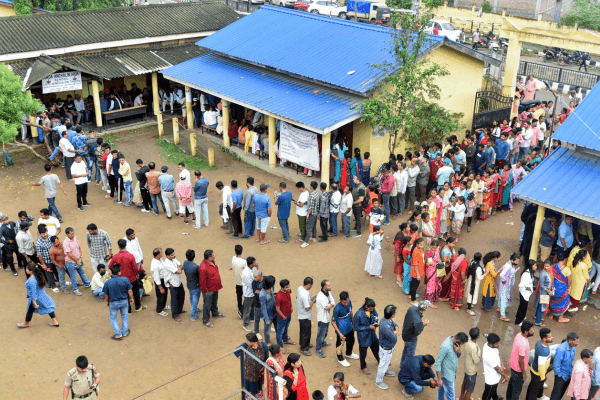By now the ritual is regrettably predictable.
A public official approaches a podium emblazoned with an official seal, perhaps flanked by the flags of their city and state, and maybe the U.S. flag. Just outside the frame, the shutters of a dozen cameras snap, capturing the official’s somber expression and ever-so-gently bowed head.
Sometimes the official is a man, sometimes a woman. Usually a mayor, but not always. This political figure will open a folder of prepared remarks or perhaps retrieve them from an inside pocket. There may be the clearing of a throat. Or a hard swallow.
This scene plays out in cities across the U.S., as we learn the grim details of yet another gruesome killing of yet another Black or brown person at the hands of law enforcement. Details vary. Maybe there’s body camera footage. Maybe it was a traffic stop. Sometimes an altercation on a sidewalk, or a raid gone wrong, or a tragic case of mistaken identity. The deceased may have been a father, or a sister, or a spouse. Or a child.
But regardless of the details or location, one element remains constant: Civic leaders call for peace and calm.
Consider, for example, the killing in March of Adam Toledo, a 13-year-old Latino boy, shot by police in the Little Village neighborhood on the west side of Chicago. At a news conference announcing the release of body camera footage, Chicago Mayor Lori Lightfoot issued an appeal for restraint: “We must proceed with deep empathy and calm and importantly, peace.”
Or the police shooting last October, of a young, unarmed Black couple an hour or so north of Chicago, in Waukegan, Ill. Marcellis Stinnette was killed and Tafara Willams, his girlfriend, was wounded when officers opened fire on their car. “I know this raises a lot of emotions in us as well and we’re all upset about this,” said Mike Nerheim, who served as state’s attorney for Lake County at the time, “but I just hope people will stay calm and respect the process.”
In March of the same year, police shot and killed 26-year-old Tyrell Fincher in Newburgh, N.Y. “I’m asking for peace in the streets and calm in our community,” said Newburgh Mayor Torrance Harvey.
And this past Tuesday, 16-year-old Ma’Khia Bryant was fatally shot by police in Columbus, Ohio, just moments before Derek Chauvin was found guilty of all three charges in the death of George Floyd in Minneapolis. “We will share information that we can as soon as it becomes available” tweeted Columbus Mayor Andrew Ginther. “I’m asking for residents to remain calm.”
Remarkably, this was not even the first time this particular mayor urged calm in the aftermath of the killing of a Black teenager in this particular city. Back in 2016, a white police officer in Columbus fatally shot a 13-year-old Black kid, Tyre King.
“Investigations take time,” said Ginther. “I ask for everyone’s patience during this difficult time.”
Calm. Peace. Patience. It is a grotesque irony that, in the wake of a police killing, public officials urge the public — and not the law enforcement officers who have taken a life — to maintain calm, exercise patience, and hold their peace.
We understand, of course, that mayors and governors seek to avoid demonstrations that lead to broken storefronts and fires. But it is particularly perverse to ask the public to exercise restraint when property is endangered, even as police officers do not manage to do the same when human life is at stake.
The killing of unarmed citizens, body camera footage clearly displaying a shoot-first approach to policing, the slaying of a child — these are all infuriating provocations. To ask a terrorized citizenry, at the peak of their grief, to respond with tranquil serenity and unruffled calm is, at best, naive. At worst, it’s callous and cruel.
In Jewish tradition, news of a death is received with a practice called, in Hebrew, k’riah, a word meaning “cutting.” It refers to the tearing of one’s clothes, a paroxysm of grief and anger at the loss of a loved one that stretches back to Jacob in the book of Genesis. When Jacob is told that his beloved son, Joseph, has been fatally attacked by an animal, he exclaims, “Joseph was torn to pieces!” and tears his clothing (Genesis 37:33-34, author’s translation).
When the blood of a Black person is spilled in the American wilderness, when another child is torn from another family, isn’t public wailing and mourning exactly what we’d expect from the grieving community?
For the rest of us, these tragedies ought to inspire self-examination, a spiritual and moral accounting. For our biblical ancestors, and for Jewish communities ever since, this has been accomplished through the calling of a public fast. The prophet Joel, for instance, responds to the suffering of his people with the lament that “the country is ravaged … joy has dried up among humanity” (Joel 1:12). In response, Joel calls the leaders to “consecrate a fast, proclaim a gathering, gather the elders … and cry out to God” (1:14).
The U.S. has subjected Black and brown people to the trauma of repeated images of death. Isn’t a public accounting called for? “Turn back to Me with all your hearts,” Joel reports God telling the people, “with fasting, weeping, and lamenting.” Is this not the time for weeping, for grieving, for an accounting to the Creator of all humanity?
It is, for sure, long overdue. We need leaders in our country who will demand such a reckoning. Instead of calling for “peace and calm” after an agent of the state takes a human life — just once — it would be so powerful for a leader to call for public mourning, self-reflection, and nationwide repentance. Perhaps, then, in the words of Joel, “Your elders shall dream dreams, and your youth shall see visions” (2:28).
And when that happens, God willing, we will finally be a nation that affords its Black and brown youth the safety and sustenance to grow into elders.
Got something to say about what you're reading? We value your feedback!







